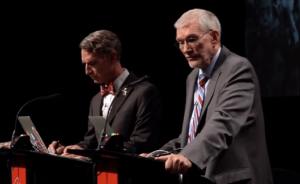
Material Apologetics: Interpreting the Purpose of Answers in Genesis’ Ark Replica

By Tom Kaden
Recently, the conflict between religion and science—or, to be more precise, between a loud religious minority and an important part of modern biology—took the unusual form of a 150-metre-long wooden ship. After about six years of planning and building on July 7, Answers in Genesis, America’s largest creationist organization, opened its Ark Encounter theme park in Northern Kentucky. In a later round of development the park is also set to feature a recreation of the Tower of Babel and other similar Biblical buildings and objects.
Across a spectrum of possible relationships between modern science and religion, Answers in Genesis is at the end which is characterized by conflict, mutual limitations and exclusions. Answers in Genesis represent Young Earth Creationism, a belief system based on a literal reading of the Bible, which assumes the earth to be about 6000 years old. According to their calculations, the Genesis Flood happened around 4400 years ago, and Answers in Genesis makes it clear that the consequences of the Flood can be observed in the findings of modern geology, biology, and anthropology, only if these findings are interpreted in the right way. Hence, the potential for conflict between their position on science and religion and modern secular science is particularly big.
The Ark as Material Apologetics
But what exactly is the Ark about for the people who built it?
In this respect, Answers in Genesis makes the purpose of their ark very clear: It serves to illustrate and render plausible their account of a central Biblical event. The questions that are being answered for visitors all revolve around this Biblical interpretation:
“How big was Noah’s Ark? How did Noah fit all the animals on board? How did Noah feed and care for all the animals? How did Noah build the Ark? We built the full-size Noah’s Ark to answer these questions—and more!” (Ark Encounter)
The enormous effort that Answers in Genesis has put into answering these questions in a concrete manner, presupposes that they consider the displayed events questionable, or see how they might be disputed. As a matter of fact, they regard the reinterpretation of, or disbelief in, the Biblical narrative as the main reason for what they think is a contemporary crisis of faith and morals in the West. Thus, their apologetics—the use of rational, systematic arguments to defend a belief system—indirectly contribute to a reformation of society in a conservative Christian sense. This link becomes apparent when Answers in Genesis refers to depictions of the Ark that they regard as counterproductive. The context in which they place this discussion is one of a supposed profound cultural crisis. In one of his many talks that are available on DVD, Ken Ham, founder and CEO of Answers in Genesis, paints a gloomy picture:
“[T]oday, we see the collapse of our Western civilization from a Christian perspective. The Bible tells us we’re in a spiritual war, and there’s no doubt from a human perspective the church seems to be losing that war. So what has happened? What is the real nature of the problem?”
Among the many examples of an ongoing secularization of the United States that Ham mentions in the course of this lecture, faulty depictions of the Ark mark one small but important aspect.
For Ken Ham, unrealistic depictions of the Ark like this are a symptom of a crisis of Christianity. Screenshot from the DVD Ken Ham’s Foundations: Relevance of Genesis (Answers in Genesis 2011).
Ham directly links his criticism of unrealistic depictions of the Ark with the fate of Christian America:
“1 Peter 3:15 says ‘always be prepared to give an answer, a defense.’ Now, one of the things we need to understand is, we need to be preparing generations today to be able to stand on the authority of the word of God and give answers to the skeptics of this age. We need to teach them, for instance, concerning Noah’s flood that Noah’s ark was a real boat. We wanna make sure we don’t teach them the way many of our Christian books do, showing Noah’s ark as an overloaded bath tub with giraffes sticking out the chimney at any moment about to sink, which teaches them as a fairy tale. We need to teach them the Bible as real history.”
This is exactly the aim Answers in Genesis pursues with its newly built Ark.
Creationism as a Rationalization of Christian Beliefs
This focus on the educational purpose of the Ark means that apologetic claims appear in the Ark on multiple levels. Of course, there is always the social-moral aspect. The depravity of mankind that led God to do away with man, save for Noah and his family, parallels many aspects of today’s society.
“Like people today, almost certainly the people of Noah’s day were busy enjoying the pleasures of life and did not believe or care that judgment was coming.” (Answers in Genesis)
Another aspect, besides the presentation of moral evidence for the Christian fundamentalist worldview, is its rational plausibility check. This aspect is often ignored or polemically discredited in the public sphere and among professional anti-creationists. Nonetheless, it cannot be ignored that the Ark, just like the entire modern creationist movement, constitutes a massive increase in the appreciation of rational evidence for Christian beliefs. In a broad, sociological sense in which the term is used here, “rational” does not mean “true”, but rather something like “internally coherent”, “following clearly expressed rules of thought”, and especially “rooted in phenomena that can be found in this world”.
To even deem it necessary to translate the belief in creation into “scientific creationism” is proof of the influence of modern scientific rationality on Christian belief, which, as one might argue from a Christian perspective, is more pure the less evidence it demands. This viewpoint was even radicalized in the history of early Christianity to the point where central doctrines were to be believed not despite, but because they were absurd.
The newly built Ark, in contrast to this, is representative of a creationist “factualist hermeneutic style” (Malise Ruthven, Fundamentalism, p. 52).
Political and Financial Aspects
Besides the propositional content inside the Ark, one must not neglect the dramatic aspects of the Ark project itself. The presentation of the Ark happens on two levels, an object-level that deals with the Ark itself, its size, apologetic value, etc., and a reflexive-level, where Answers in Genesis talks about the process of building the Ark, about difficulties overcome, projected visitor numbers, etc. This latter level proves, according to Answers in Genesis, that the entire project has been blessed and even created by God. A description to a video on the Ark Encounter website that depicts the history of the project states very bluntly:
“See how the Lord has worked mightily over the years to make this project a reality.” (Ark Encounter)
The organization, therefore, practices a sort of reflexive spiritual capitalism: the Ark itself is presented as an attraction, but the entire process is utilized as symbolic capital. The mere interpretation of success (the completion of the Ark) as a divine sanction (God wants the Ark) is already known from Max Weber’s famous studies on the spirit of capitalism. According to Weber, the adherents of the Calvinist doctrine of salvation interpreted their own vocational success, as a sign of being chosen by God and thus more or less inadvertently promoted capitalist tendencies. Answers in Genesis does the same thing, but the organization does not stop there. It closes the circle by interpreting these signs of their own state of grace to acquire more signs of their state of grace. The “innerworldly salvation” keeps itself going to a certain extent, and thus becomes a version of the American “prosperity gospel”. Success breeds success, divine sanction breeds divine sanction, and both permanently refer to, and mutually reinforce, each other.
Hence, on a performative level the Ark is deeply connected to general American civil religious values. This is another sign that “conflict between science and religion” by no means is limited to the level of competing theories of explaining the world.
A Game among Professionals
The financial aspects of the Ark’s construction especially make it clear that it is not only part of an organization’s struggle for the attention of its audience, but also part of a struggle with other professional players in the science-and-religion controversy in the United States. I have argued in an earlier blog on this website that the wide range of phenomena denoted by the term “creationism” in the United States can be regarded in part as the result of the interactions between professional creationists and anti-creationists.
Answers in Genesis’ Ark supports the above argument to the point that it likely would not have been built without this kind of interaction. The organization started the project in 2010, but the actual construction of the Ark was impeded for a long time due to insufficient funds. This changed after Ken Ham debated the popular science journalist and presenter Bill Nye on February 4, 2014. The Debate was performed on the premises of Answers in Genesis’ Creation Museum, not far from where the Ark stands today, and it was broadcast live on the internet, with over seven million people watching. Ham managed well during his debate contributions to weave in information about his organization, its purpose, and the Ark. As one consequence of this event, Answers in Genesis was able to sell enough bonds so that the actual construction of the Ark could be announced merely a few weeks after the debate.

Still from Ken Ham debating Bill Nye on February 4, 2014
In this instance, an exchange between professionals enabled the continuation of the conflict at the public level that would likely not have happened otherwise.
The Struggle for Cultural Authority
Answers in Genesis and creationism in general are seen as important exponents of the conflict between science and religion in the United States. Out of many examples of this, a website that features numerous texts dealing with the compatibility of science and religion from a Christian perspective is simply called “noanswersingenesis.org.au”. The analysis of conflict dimensions that become visible in the Ark shows that this generic understanding is at the same time too narrow and too wide. It is too wide, because the mission of Answers in Genesis is by no means the refutation of all of science, or the fundamental opposition against scientific rationality per se. On the contrary, it was argued that the Ark and creationism in general actually represent a certain form of rationalization of religious beliefs.
On the other hand, the view that the Ark is “merely” another iteration of the conflict between science and religion is too narrow. The Ark is a focal point of entertainment, apologetics, economy, hermeneutics, and science. To adopt Answers in Genesis’ interpretation of its own Ark means to adopt an entire worldview. What formula could be employed to encompass all those different aspects of the Ark? The historian Frank Turner coined the phrase “contesting cultural authority” to summarize his analyses of Victorian British conflict situations surrounding science and religion, “whereby groups advocating different ideas came to the fore, claimed the right to be heard, and established institutions that fostered their own ideas and values” (Turner 1993: xii). The scientific naturalists of the 19th century, like Thomas Huxley and John Tyndall, were interested in the autonomy of their fields of scientific research from religious influence. For them, this differentiation was the precondition to gain scientific authority , on which they tried to build their cultural authority. Answers in Genesis seeks to gain cultural authority through the opposite operation. The organization is interested in a Christianization or Re-Christianization of American society, hence in a collapse of religious and secular logic (science being part of this), and it clearly expresses this claim with regard to cultural authority:
“[W]e are losing the culture—America will become like Europe and the UK if it continues in the direction it is going regarding biblical authority. And why? I believe there has been an increasing generational loss of Biblical authority because so many in the church have opened the door to compromise beginning in Genesis.” (Answers in Genesis Blog)
This, is what floats their boat.

Tom Kaden is a sociologist of religion. Since 2018, Tom pursues his Habilitation (second PhD) at the University of Bayreuth. He currently serves as co-investigator for the German part of Science and Religion: A Global Perspective.

